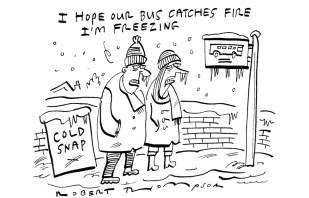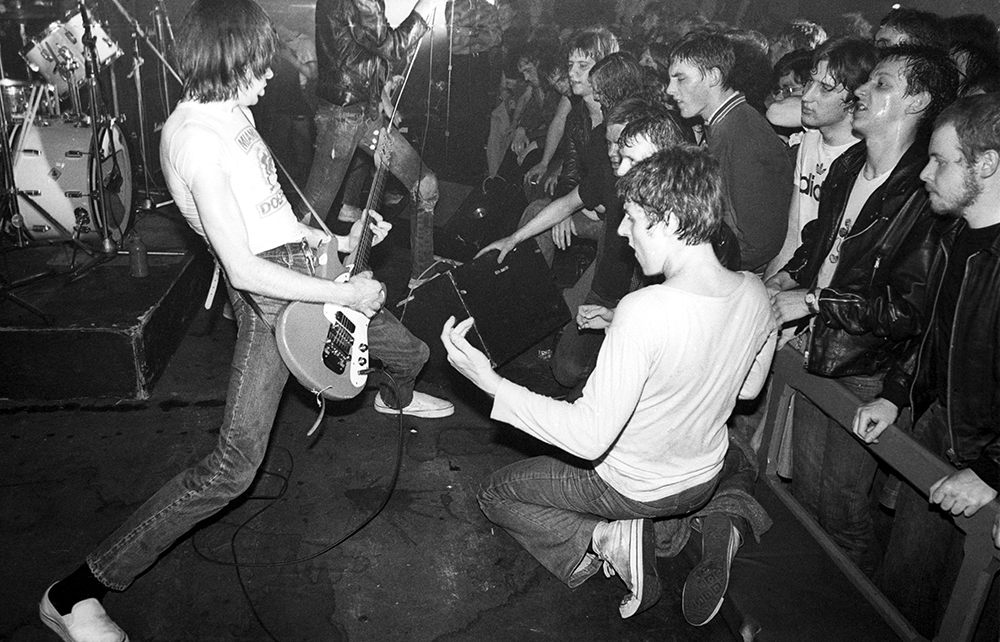‘If any journalist asks you about the Beatles because you’re from Liverpool, say you hate them and you don’t listen to that old crap.’ Such was the advice that the DJ Roger Eagle, promoter and founder of the legendary (and there really is no other word for it) Merseyside punk club Eric’s, dispensed to a young Ian Broudie in the late 1970s. Little could either have imagined that almost simultaneously John Lennon, over in New York in the Dakota Building, was busy demo-ing ‘Now and Then’. It was a song which would resurface as the final Beatles single and top the charts some 40-odd years later, aided by a form of AI technology that possibly only members of Dalek I, the Wirral’s wackier answer to Kraftwerk, could have dreamt of back then.
Host to gigs by everyone from the Sex Pistols to Talking Heads, Eric’s (christened in an ironic riposte to nightclubs bearing Sloaney girls names like Annabel’s) was located on Mathew Street, near the former site of the Cavern. But as each of these three memoirs by musicians who emerged a decade later and in a fresh wave of Mersey beat bands confirm, the Beatles were childish things that Liverpool punks had to put away, at least publicly, for a year or two anyway. As Paul Simpson, the co-founder with Julian Cope of the Teardrop Explodes, who confesses to hiding most of his pre-punk records under his bed come 1977, notes, the mantra, taken from the Clash, was ‘No Elvis, Beatles or Rolling Stones’.
After the initial smash and gob of punk, however, the Liverpool scene developed its own distinctive and distinctly psychedelic identity, clad in the trademark ‘bleak northern overcoats’ as Echo and the Bunnymen’s Will Sergeant characterised them. Although Sergeant himself was fairly abstemious when it came to narcotics, he suggests that Operation Julie, the notorious late-1970s police raids on LSD labs over the border in Wales, may have resulted in an influx of acid to Liverpool. Certainly Simpson, his one-time musical collaborator in the Industrial Domestic duo, and whose bedsit at 14 Rodney Street became a hub of Eric’s adjacent action, was an enthusiast, as Revolutionary Spirit attests in often lugubrious detail. That said, Benylin cough syrup was a more regular tipple, and Knut Hamsun and Ernest Hemingway Simpson’s self-proclaimed literary role models, with the decayed Georgian terraces and shuttered docks of Liverpool standing in for slummy Oslo and Paris.
The mantra of Liverpool punks, taken from the Clash, was ‘No Elvis, Beatles or Rolling Stones’
Echoes, meanwhile, is Sergeant’s second book; and the guitarist is fast shaping up to becoming the Karl Ove Knausgåard of rock memoirists (and I intend that as a compliment), since this highly entertaining volume only takes us up to 1982. Here he charts the band’s progress from the arrival, in 1979, of the drummer Pete De Freitas as a replacement for their Mini-Pops drum machine (an event he half-jokingly compares to Pete Best ‘getting the Beatles-boot up the arse’ in favour of Ringo) until the release of ‘The Back of Love’, the group’s first top-20 single. It was a record produced by Broudie, who – underscoring the incestuousness of these Merseysiders – was at that time his flatmate.
Sergeant is particularly good at describing the dynamic of the group and how each of ‘the four minds’, playing off each other in rehearsals, gradually came to forge their sound, though he admits that the word ‘jam’ was, on punk rock principles, initially anathema to him. Guitar amps were chosen on the basis of ‘would the Velvet Underground have used them?’ And he relates the sometimes masochistic lengths the Bunnymen went to to avoid rock clichés. Cymbals, at one point, were considered hopelessly neanderthal.
He suspects he might well have vetoed Rockfield Studios in Monmouthshire, where the Bunnymen’s first two albums were recorded and they befriended Led Zeppelin’s Robert Plant, had he known Queen had visited earlier. He ruefully remembers flouncing out of the Rainbow Bar and Grill on Los Angeles’s Sunset Strip during their first American tour after learning that some of Rod Stewart’s backing band were in residence.
Simpson was, if anything, even more exacting and self-sabotaging. Alarmed by the commerciality of a forthcoming single, he bailed on the Teardrop Explodes on the brink of their success, and took a job in a tea room instead. He was subsequently ousted in a coup from his own group, the Wild Swans. And after teaming up with Broudie to form Care, whose single ‘Flaming Sword’ (in Simpson’s words, ‘a bassoon-laden song with lyrics about trying to flog angelic weaponry’) entered the top 50, he walked out on the sessions for their debut album. His story is full of other wonderfully Spinal Tap-esque moments, involving collapsing stage equipment and a late-career renaissance thanks to fandom in the Far East. The Wild Swans, it turns out, are musical gods in the Philippines.

All three books provide immersion in a lost world of pop, where entire careers turned on a ‘Single of the Week’ review in the music press or a spin of the disc by John Peel. Broudie (whom Sergeant fondly recalls sporting very non-year-zero dungarees, lending him ‘the appearance of undernourished kid from a Midwest farmstead’) recalls listening in horror to the Radio 1 DJ Steve Wright yanking the Lightning Seeds’ song ‘Pure’ off halfway through. To Broudie’s immense relief, Wright then pronounced it ‘fantastic’ and proceeded to play it over again, duly helping the group (Broudie solo in all but name) to secure a hit with their first release.
Broudie, who cut his musical teeth with Big In Japan, the short-lived Liverpool art punk combo whose line-up included Bill Drummond, later of £1 million-burning KLF fame, and the future Frankie Goes to Hollywood singer Holly Johnson, has enjoyed by far the greatest commercial success. ‘Three Lions’, the multi-chart-topping football anthem he wrote with David Baddiel and Frank Skinner, has had the terrace-chant afterlife of ‘You’ll Never Walk Alone’.
But the limelight is evidently something Broudie remains uncomfortable with, and an abiding regret is that he never found the Mick Jagger to his Keith Richards to front the Lightning Seeds. Tomorrow’s Here Today, written with the KLF biographer John Higgs, nevertheless contains touching reminiscences about his collaborations with Terry Hall, the late Specials singer; and there are insights into the mind games of the Fall’s exacting leader Mark E. Smith.
Broudie is also endearingly frank about the weaknesses of some of his own albums. This honesty might be said to be part and parcel of coming from Liverpool. As he sees it, the difference between Liverpool and its rival Manchester is that while boastful Mancunians insist their city is ‘the best in the world’, Scousers just call their home their ‘favourite place’.






Comments